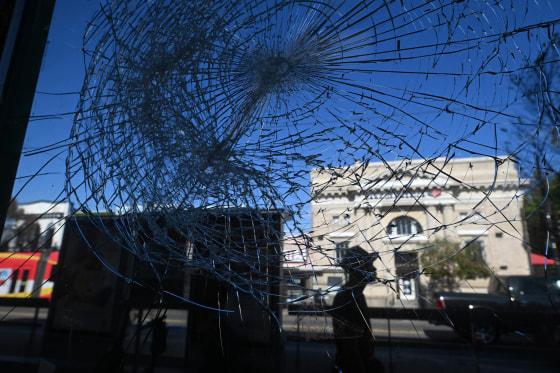Former President Donald Trump has called for the federal government to ‚Äútake over‚ÄĚ and directly govern Washington D.C., reigniting longstanding debates over the city‚Äôs political status and self-governance. Speaking amid ongoing discussions about D.C.‚Äôs push for statehood and local autonomy, Trump‚Äôs remarks underscore the complex and contentious relationship between the nation‚Äôs capital and federal authorities. This development adds a new dimension to the broader national conversation on representation, local control, and the future of Washington D.C.‚Äôs government.
Trump Calls for Federal Control Over Washington D.C. Governance
In a bold move that stirred significant debate, former President Donald Trump urged the federal government to assume direct control over the administration of Washington D.C. Highlighting his criticism of local governance, Trump argued that federal oversight would address inefficiencies and maintain order in the nation‚Äôs capital, which he described as being ‚Äúout of control.‚ÄĚ He emphasized the need for stronger leadership, pointing to rising crime rates and concerns over budget mismanagement as key reasons for this unprecedented proposal.
Trump’s call ignited a spectrum of responses from politicians and residents alike. Supporters contend that federal intervention could restore stability, while detractors warn it might undermine local autonomy and democratic principles. The debate sparked by Trump’s statements centers on:
- Constitutional implications of federal takeover versus home rule
- Potential impact on local services and community representation
- Precedents for federal involvement in district governance
| Issue | Current D.C. Status | Federal Takeover Potential |
|---|---|---|
| Governance | Local elected officials | Appointed federal administrators |
| Law Enforcement | D.C. Metropolitan Police | Federal law enforcement oversight |
| Budget Control | Locally approved budget | Congressional approval and management |
Implications for Local Autonomy and Political Representation
The proposal for federal intervention in Washington D.C.’s governance raises profound concerns about undermining the city’s hard-won local autonomy. Residents and city officials have long advocated for self-governance, emphasizing that local officials better understand the unique challenges and needs of their communities. A federal takeover could disrupt this dynamic, potentially sidelining local voices in favor of centralized decision-making that may not reflect the priorities of D.C.’s diverse population.
Political representation in Congress is another critical issue at stake. Washington D.C. currently has no voting representation in the House or Senate, despite its substantial population. A federal takeover could further dilute its efforts to gain full representation and equal voice in national affairs. This situation evokes concerns over democratic principles and equal representation, especially considering:
- Residents’ lack of voting senators in the U.S. Senate
- Challenges in passing local legislation without congressional approval
- Ongoing debates over D.C. statehood and political equality
| Aspect | Current Status | Impact of Federal Takeover |
|---|---|---|
| Local Governance | Managed by D.C. Mayor and Council | Potential reduction in local decision-making |
| Congressional Representation | Non-voting delegate in House, no Senate seats | Risk of further marginalization |
| Legislative Autonomy | Local laws subject to congressional review | Increased federal control over laws |
Reactions from D.C. Officials and Congressional Leaders
The proposal has ignited a firestorm among Washington D.C. officials who emphasize the importance of local governance and home rule. Mayor Muriel Bowser quickly dismissed the idea, calling it “an attack on the democratic rights of D.C. residents” and reaffirming the city’s push for statehood. City Council members echoed Bowser’s stance, highlighting the potential consequences of federal oversight, including reduced accountability and diminished public services tailored to the unique needs of the capital.
- Congressional leaders expressed mixed reactions. Some Republicans applauded the suggestion as a means to address perceived inefficiencies in city management, while Democrats criticized it as an overreach undermining democratic processes.
- House Speaker warned that federal intervention would set a dangerous precedent, igniting partisan debates over the capital’s autonomy.
- Local advocacy groups organized rallies defending D.C.’s right to self-governance, emphasizing the city’s diverse population and growing economy that require tailored policy-making.
| Stakeholder | Reaction | Potential Impact |
|---|---|---|
| Mayor of D.C. | Strong Opposition | Mobilizing statehood efforts |
| Republican Congress Members | Partial Support | Federal oversight debate |
| Democratic Congress Members | Firm Opposition | Protecting local autonomy |
| Local Advocacy Groups | Active Resistance | Public advocacy campaigns |
Potential Legal and Constitutional Challenges Ahead
The proposal for federal authorities to assume control over Washington D.C. is poised to ignite a series of complex legal and constitutional debates. Central to the controversy is the question of whether such federal intervention infringes on the District’s limited autonomy granted under the Home Rule Act of 1973. Critics argue that overriding locally elected officials’ authority could be seen as a violation of democratic principles, while proponents contend it‚Äôs within Congress‚Äôs constitutional power to ‚Äúexercise exclusive Legislation‚ÄĚ over the federal district, as stipulated in Article I, Section 8 of the U.S. Constitution.
Potential challenges likely include:
- Judicial review‚ÄĒlawsuits questioning the constitutionality of federal takeover attempts;
- Political resistance‚ÄĒopposition by D.C. officials and civil rights groups advocating for local self-governance;
- Precedent concerns‚ÄĒfears that such a move could set a precedent for federal intervention in other local jurisdictions.
| Key Legal Arguments | Implications |
|---|---|
| Congressional Authority over D.C. | Supports potential federal governance intervention |
| Home Rule Protections | Challenges federal overreach, affirms local autonomy |
| Voting Rights concerns | Raises debates on representation and democratic fairness |
To Wrap It Up
As the debate over the governance of Washington D.C. continues, former President Donald Trump’s call for federal takeover adds a new dimension to an already contentious issue. With advocates for D.C. statehood pushing for greater autonomy and representation, Trump’s stance highlights the ongoing political divisions surrounding the capital’s future. The conversation is far from over, and how policymakers respond could significantly impact the balance of power in the nation’s capital.







